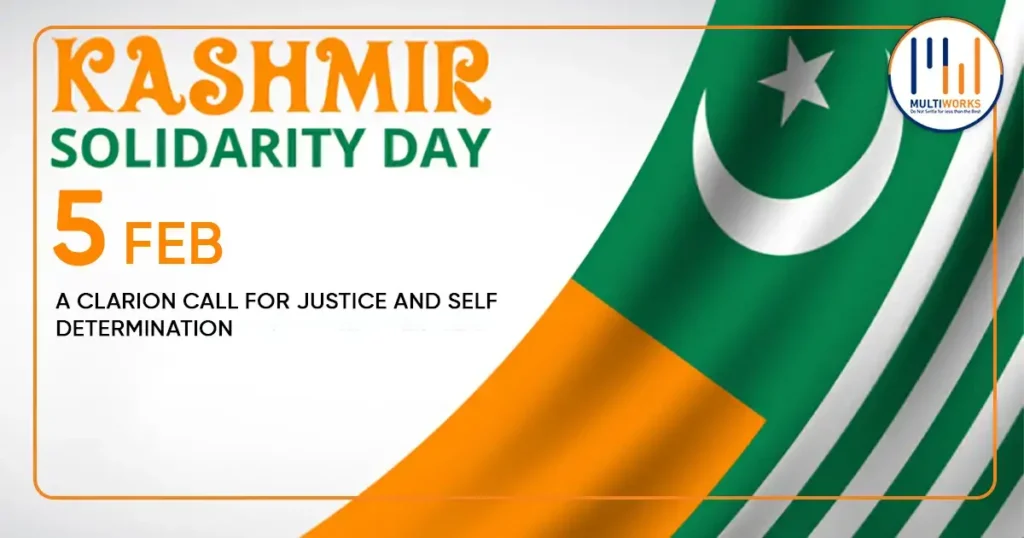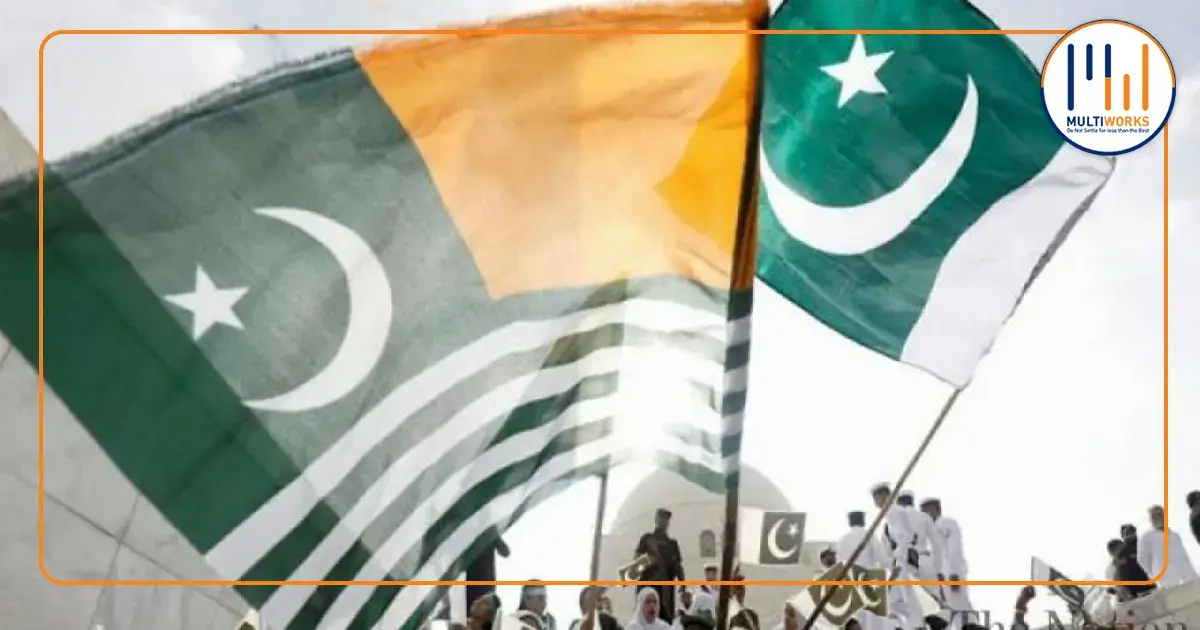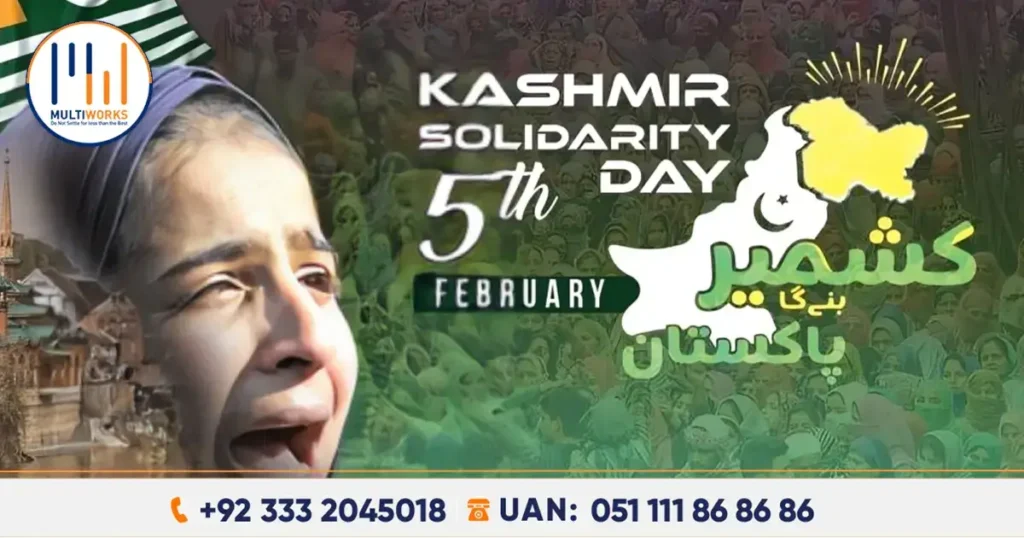Table of Contents

Kashmir Day – An Introduction
Multiworks, Islamabad: This blog delves into the profound significance of Kashmir Day for Pakistan, an annual commemoration observed on February 5th. It explores the historical context, the ongoing human rights abuses, and the unwavering Pakistani support for the Kashmiri people’s right to self-determination. Drawing upon recent developments, the blog aims to present a compelling narrative that resonates with a global audience and underscores the integral role of Kashmir in Pakistan’s identity and foreign policy.
Historical Context of Kashmir: A Land of Beauty and Contention
Kashmir: A Land of Enchantment:
- A picturesque region nestled in the Himalayas, renowned for its breathtaking natural beauty, rich cultural heritage, and unique blend of diverse communities.
- A land of stunning landscapes, from snow-capped peaks and verdant valleys to crystal-clear lakes and gushing rivers.
- A cradle of civilizations, with evidence of human habitation dating back millennia.
- A region steeped in history, with ancient mosques, majestic forts, and exquisite gardens bearing witness to its glorious past.
- A land of Sufi saints and mystic poets, whose teachings and poetry continue to inspire and enchant generations.
The Partition of India and the Kashmir Dispute: 5th February Kashmir Day
- The 1947 partition of India, a momentous event intended to create two independent states, India and Pakistan, based on religious lines, tragically sowed the seeds of conflict and division.
- The historical injustice done to Kashmiris when the Maharaja Hari Singh illegitimately acceded to India against will of the Kashmiri people where was Muslim majority.
- The future of Kashmir, a Muslim-majority princely state, remained uncertain amidst the chaos of partition.
- The Maharaja of Kashmir, Hari Singh, faced immense pressure from India partly of its immense size, leaving the fate of Kashmiris to the Indian cruelty.
- Pakistan contends that the accession was invalid and that the Kashmiri people should have been given the right to decide their own future through a free and impartial plebiscite and that is the ultimate goal of the celebration of Kashmir Day.
The UN Resolutions and the Right to Self-Determination: 5th February Day of Solidarity with Kashmir
- In an effort to resolve the Kashmir dispute peacefully, the United Nations Security Council passed a series of resolutions emphasizing the importance of a plebiscite to allow the Kashmiri people to determine their own future.
- These resolutions, particularly UNSC Resolution 47, called for a demilitarization of the region and a free and impartial plebiscite under the supervision of the United Nations.
- The promise of a plebiscite, however, has remained unfulfilled, leaving the Kashmir dispute unresolved and fueling tensions between India and Pakistan.
- The continued denial of the Kashmiri people’s right to self-determination has been a major source of friction between India and Pakistan, leading to numerous conflicts and exacerbating tensions in the region.
Kashmir Day: A Symbol of Solidarity and Support
Kashmir Day History: Remembrance and Reflection:
- Historically 5th February is a day of Kashmir, observed annually on February 5th, serves as a poignant reminder of the Kashmiri people’s ongoing struggle for freedom and their unwavering resilience in the face of oppression.
- Kashmir day for Pakistanis to remember the sacrifices made by the Kashmiri people in their fight for self-determination and to express their unwavering solidarity with their Kashmiri brethren.
- It is a day for reflection on the historical injustices inflicted upon the Kashmiri people and the continued denial of their fundamental rights.
- 5th February provides an opportunity for Pakistanis to reaffirm their commitment to the just cause of the Kashmiri people and to raise their voices against the ongoing human rights abuses in Indian-administered Kashmir.
Demonstrations and Rallies: A Show of Unity
- Across Pakistan, vibrant demonstrations and rallies are held to commemorate 5th February Kashmir Day, with participants waving Pakistani and Kashmiri flags and chanting slogans in support of self-determination.
- From the bustling streets of Karachi to the serene valleys of the North, people from all walks of life, including students, intellectuals, and political leaders, participate in these demonstrations.
- These gatherings serve as a powerful display of public sentiment and a collective expression of the nation’s unwavering support for the Kashmiris people.
- They also serve to mobilise public opinion and raise awareness about the Kashmir issue within Pakistan and internationally.
Kashmir Day Speeches, Quotes, and Kashmir Day Holiday
- Moreover, Kashmir Day Speech in English are given by children in the schools and colleges at arranged functions for Kashmir Day. Kashmir Day speech in Urdu with fine literary taste is commonly delivered for showing the solidarity with the Kashmir Cause at school and college level.
- Kashmir Day is known in the vacation calendar of Pakistan with the term Kashmir Day Holiday. Kashmir Day 2025 holiday is yet to be confirmed by the incumbent government.
- Kashmir Day quotes are searched by the people around the world and shared on the social media platforms to demonstrate solidarity with the Kashmiris.
- Students are given assignment to bring Kashmir Day speech in Urdu and English with their creativity. A sample of such a short speech on Kashmir Day in Urdu is given below.

Political and Diplomatic Engagements:
- Pakistani leaders, including the Prime Minister, President, and Foreign Minister, often address the nation on Kashmir Day, highlighting the importance of the issue and reiterating Pakistan’s commitment to a peaceful and just resolution.
- These addresses often emphasize the historical, moral, and political dimensions of the Kashmir dispute and reiterate Pakistan’s unwavering support for the Kashmiri people’s right to self-determination.
- Diplomatic efforts are also intensified on this day, with Pakistan engaging with the international community to raise awareness about the human rights situation in Indian-Illegally Occupied Kashmir – (IIOK), and to mobilize international support for a peaceful resolution of the dispute.
- Pakistan’s diplomatic missions abroad organize events and seminars to raise awareness about the Kashmir issue and to garner international support for the Kashmiri people’s just cause.
The Human Rights Crisis in Indian-Administered Kashmir
A Decade of Curfews and Crackdowns:
- Since the revocation of Article 370 and Article 35A of the Indian Constitution in August 2019, Indian-Illegally Occupied Kashmir – (IIOK), has witnessed a severe crackdown on civil liberties, with widespread restrictions on movement, communication, and freedom of expression.
- The region has been subjected to prolonged curfews, internet shutdowns, and arbitrary arrests, creating a climate of fear and uncertainty among the Kashmiri population.
- The communication blackout, which lasted for months, severely impacted the lives of Kashmiris, disrupting education, healthcare, and economic activities.
- The restrictions on movement have severely hampered the ability of Kashmiris to access essential services, including healthcare, education, and livelihood opportunities.
Escalating Violence and Human Rights Abuses:
- Reports of extrajudicial killings, enforced disappearances, and the use of excessive force by Indian security forces are deeply concerning and continue to escalate.
- The Indian government has been accused of using draconian laws like the Public Safety Act and the Unlawful Activities Prevention Act to suppress dissent and silence critical voices.
- The human rights situation in Indian-Illegally Occupied Kashmir – (IIOK has deteriorated significantly, with international human rights organizations expressing grave concerns over the ongoing abuses and calling for an independent investigation into the human rights violations.
The Plight of Political Prisoners:
- Numerous Kashmiri political leaders and activists, including prominent figures like Mirwaiz Umar Farooq and Yasin Malik, have been detained, often without due process, and subjected to harsh conditions in prisons.
- The suppression of dissent and the silencing of critical voices have become a hallmark of the Indian government’s approach to the Kashmir issue, creating a climate of fear and intimidation among the Kashmiri population.
- The arbitrary detention of political leaders and activists has severely impacted the political landscape in Kashmir, hindering efforts towards a peaceful resolution of the dispute.
Pakistan’s Consistent Advocacy for a Just and Peaceful Resolution
Diplomatic Efforts at the International Forum:
- Pakistan has consistently raised the Kashmir issue at various international forums, including the United Nations, the Organization of Islamic Cooperation (OIC), and other multilateral platforms.
- It has actively sought to mobilize international support for a peaceful and just resolution of the dispute in accordance with UN Security Council resolutions.
- Pakistan has engaged in extensive diplomatic efforts to apprise the international community of the grave human rights situation in Indian-administered Kashmir and to expose the Indian government’s repressive policies.
- It has presented compelling evidence of human rights violations, including extrajudicial killings, enforced disappearances, and the use of excessive force by Indian security forces.
Moral and Political Support for the Kashmiri People:
- Pakistan has provided unwavering moral and political support to the Kashmiri people in their struggle for freedom and self-determination.
- It has extended humanitarian assistance to alleviate the suffering of the Kashmiri people, providing medical aid, food supplies, and educational opportunities.
- Pakistan has also played a crucial role in raising awareness about the Kashmir issue within the international community, mobilizing public opinion and garnering support for the Kashmiri people’s just cause.
- It has consistently emphasized the importance of a peaceful and just resolution of the dispute through dialogue and diplomacy.
The Role of Media and Civil Society:
- The Pakistani media plays a vital role in disseminating information about the Kashmir issue and highlighting the human rights abuses in Indian-administered Kashmir.
- Pakistani media outlets regularly cover the Kashmir issue, providing in-depth analysis, investigative reports, and eyewitness accounts of the human rights violations.
- Civil society organizations in Pakistan have also been actively engaged in raising awareness about the Kashmir issue and mobilizing public support for the Kashmiri people.
- These organizations have organized protests, seminars, and awareness campaigns to highlight the plight of the Kashmiri people and to demand a just and peaceful resolution of the dispute.
Recent Developments and the Way Forward
The Global Impact of the Kashmir Issue:
- The Kashmir dispute has significant regional and global implications, impacting regional stability, peace, and security.
- The escalation of tensions between India and Pakistan over Kashmir poses a serious threat to international peace and security, with the potential for a nuclear confrontation.
- The Kashmir issue has also had a significant impact on the economic and social development of the region, hindering regional cooperation and integration.
The Need for a Peaceful and Diplomatic Resolution:
- The only viable path forward is a peaceful and diplomatic resolution of the Kashmir dispute through dialogue and diplomacy.
- The resumption of meaningful dialogue between India and Pakistan on all outstanding issues, including Kashmir, is crucial for achieving a lasting peace in the region.
- A comprehensive and durable solution to the Kashmir dispute can only be achieved through a political process that addresses the legitimate aspirations of the Kashmiri people.
- The international community must play a constructive role in facilitating a meaningful dialogue between India and Pakistan and in creating an environment conducive to a peaceful resolution of the dispute.
Respect for Human Rights and International Law:
- India must respect the human rights of the Kashmiri people and uphold international law and norms in its dealings with the disputed territory.
- The Indian government must end the human rights abuses in Indian-administered Kashmir, including the use of excessive force, arbitrary arrests, and the suppression of dissent.
- India must also allow unhindered access to independent human rights observers and international media to investigate the human rights situation in Kashmir.
The Importance of Sustained International Pressure:
- Sustained international pressure and engagement are crucial to ensure that the Kashmir issue remains on the international agenda and to prevent a further deterioration of the situation.
- The international community must continue to raise its voice in support of the Kashmiri people’s right to self-determination and urge India to engage in meaningful dialogue with Pakistan.
- The United Nations and other international organizations must play a more proactive role in addressing the Kashmir dispute and in promoting a peaceful and just resolution.
The Enduring Spirit of the Kashmiri People
Resilience in the Face of Adversity:
- Despite facing immense challenges and enduring decades of oppression, the Kashmiri people have demonstrated remarkable resilience and unwavering determination.
- They have continued to resist the Indian occupation and strive for their fundamental right to self-determination, despite facing immense hardships and facing the brutal suppression of their legitimate aspirations.
- The Kashmiri people’s unwavering commitment to their just cause is a testament to their courage, resilience, and unwavering belief in the power of peaceful resistance.
A Beacon of Hope for Self-Determination:
- The Kashmiri struggle for freedom serves as a beacon of hope for oppressed people around the world, inspiring them to fight for their rights and resist injustice.
- It reminds us that the struggle for freedom and self-determination is an ongoing and universal struggle, and that the human spirit can overcome even the most formidable obstacles.
The Promise of a Peaceful and Just Future:
- The Kashmiri people’s unwavering commitment to their just cause and their unwavering belief in the power of peaceful resistance will ultimately prevail.
- A just and lasting resolution of the Kashmir dispute will bring peace, stability, and prosperity to the entire region, allowing the people of Kashmir to finally realize their full potential and live in peace and dignity.
- A peaceful and just resolution of the Kashmir dispute will also serve as a model for resolving other protracted conflicts around the world, demonstrating the power of dialogue, diplomacy, and respect for human rights.

Conclusion:
Kashmir Day is a solemn occasion for Pakistanis to reaffirm their unwavering solidarity with the Kashmiri people in their just struggle for freedom and self-determination. It is a day to remember the sacrifices made by the Kashmiri people and to recommit ourselves to the pursuit of a peaceful and just resolution of the Kashmir dispute.
The Kashmir issue is not merely a territorial dispute; it is a matter of justice, human rights, and self-determination. It is a reminder that the denial of fundamental rights and the suppression of legitimate aspirations can have profound and far-reaching consequences.
Pakistan remains committed to a peaceful and just resolution of the Kashmir dispute through dialogue and diplomacy. We will continue to raise our voice in support of the Kashmiri people’s right to self-determination and to work with the international community to find a lasting solution to this long-standing conflict.
The future of Kashmir lies in peace, justice, and self-determination. Let us all work together to ensure that the aspirations of the Kashmiri people are realized, and that peace and stability prevail in the region.
FAQ
Most frequent questions and answers
Kashmir Day Solidarity in Pakistan is celebrated on 5th February every year.
Kashmir Solidarity Day in Pakistan is generally observed as holiday. For Kashmir Day 2025 there is no official notification yet, however, in the meantime it is expected that government will announce it as a public holiday.
Kashmir Day 2025 Message – A Pledge to Justice & Freedom
“Kashmir is not just a land; it’s the heartbeat of Pakistan. For decades, the people of Kashmir have endured oppression, their voices silenced, their rights denied. Yet, their spirit remains unbroken.
On this Kashmir Solidarity Day, we reaffirm our unwavering support for our Kashmiri brothers and sisters. Pakistan stands with Kashmir—today, tomorrow, always. Their struggle for self-determination is our cause, and their freedom is our mission.”
The 5th February Kashmir Solidarity Day is celebrated in Pakistan and the around the world to show solidarity to the Kashmir Cause and calls for stopping of oppression at the hands of the Indian security forces and allowing Kashmiris to hold their right of self-determination enshrined in the United Nation Security Council Resolution 47.
Yes, Pakistanis can buy property in Azad Jammu & Kashmir (AJK). However, non-AJK residents must obtain a No Objection Certificate (NOC) from the AJK government before purchasing land.





